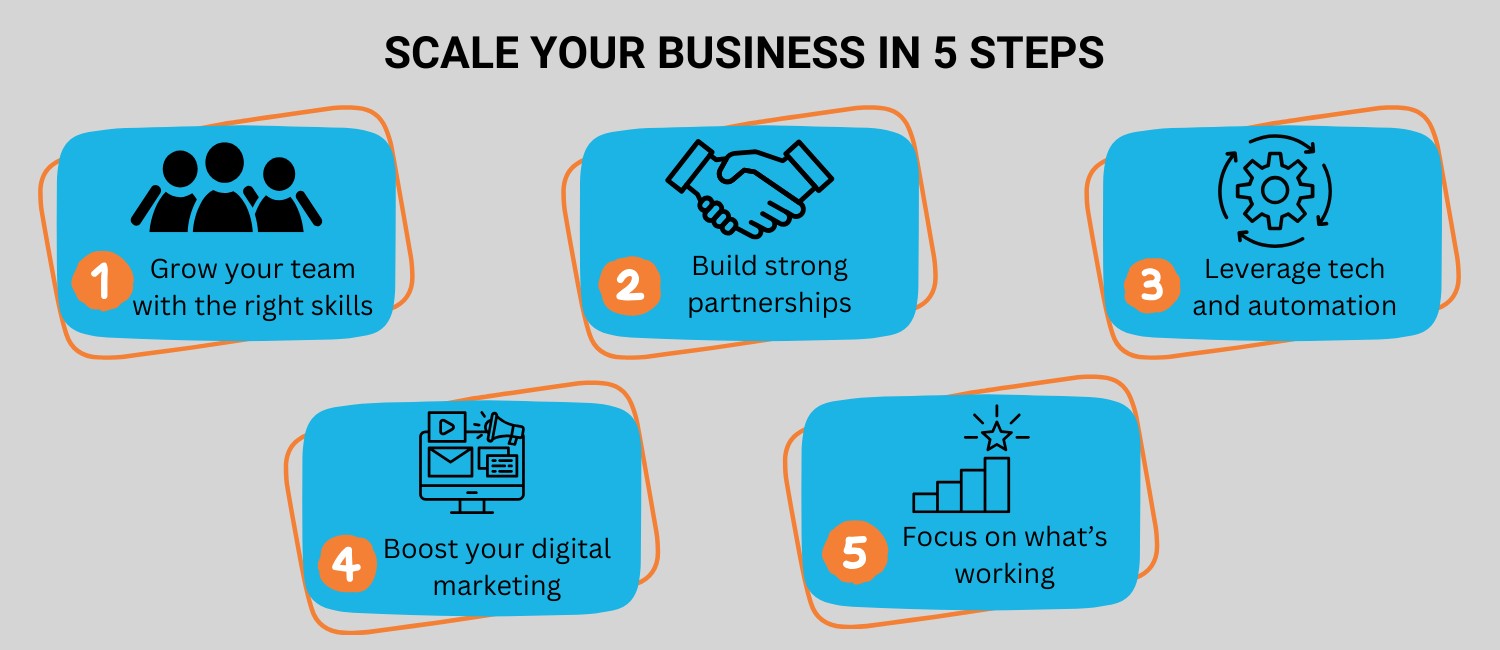Are you an entrepreneur facing an exciting but overwhelming point where your business is gaining traction, but you’re unsure how to take it to the next level? Growth signs are there, but how do you scale sustainably?
The challenges and opportunities for scaling a business have evolved in recent years, driven by technological advancements, changing consumer behaviour, and global economic shifts. Want to know how to navigate these moments? Let’s break down what scaling means and uncover five practical strategies to grow your company efficiently.
Key takeaways
- It could be time to scale your business when you notice consistency in demand, profitability, and operations.
- Automation tools, such as CRMs and chatbots, significantly reduce manual workloads while improving customer engagement and scalability.
- Focus resources on top-performing products or services to drive sustainable growth.
Understanding scaling vs. business growth
People often use ‘growth’ and ‘scaling’ interchangeably, but they represent distinct approaches to business development.
Growth typically involves expanding the size or revenue of your business, broadening market presence, diversifying product lines, or gaining more customers and employees.
In contrast, scaling is about maximising efficiency while minimising costs and resources. It focuses on refining internal processes, incorporating technology, and optimising systems to handle increased demands without proportionally increasing resources. Put simply, growth is about making the business bigger, while scaling is about streamlining operations.
When should you scale your business?
Spotting the best time to scale your business can be just as important as the strategies you use to expand. While building a scalable business always involves some risk, aim to act when your business is fully established and cash flow is steady. Here are some typical indicators that your business is ready to scale:
- Stable and consistent demand – Your business consistently meets or exceeds current capacity. Look for increased sales, a growing customer base, or a surge in enquiries.
- Proven profitability – Scaling a business too early can cause financial strain. Assess your overall financial health to determine consistent profitability
- Exceeding previous goals – Reaching or exceeding targets in market share or customer acquisition suggests that your business is ready for the next level.
The right time to scale your business is when you see proof that operations, finances, and market demand are stable.
How to scale your business: Five proven strategies
Ready to scale your business? Here are the five ways to do it safely and strategically.
1. Grow your team with the right skills
Scaling your business relies on building a team of skilled people. With growing demand comes growing workloads and responsibilities. Ensure you have enough staff to tackle tasks efficiently while maintaining customer satisfaction. Look to hire people with skill sets that complement your own so you can diversify expertise across the company, from customer service to marketing.
But besides hiring new employees, you should also look for ways to nurture and upskill your existing workforce. Create a culture of ownership and invest in your employees’ long-term development with training opportunities and regular communication in the form of team meetings and one-to-one check-ins. This approach equips you for increased demand and ensures your team becomes the driving force behind the efficiency and innovation needed to build a scalable business.
2. Build strong partnerships that open doors
Forming partnerships is essential to scaling your business. The right collaboration can open doors to new markets, boost brand awareness, and even give your brand a competitive edge.
Partnerships include your relationships with local suppliers, distributors, and other key stakeholders. Your partners can have a huge impact on your brand image, so choose carefully and strategically. Look for partners with shared values and objectives, ensuring they align with your goals.
It’s also worth collaborating with businesses that excel in areas where you may be lacking, which may help strengthen your offering. Before agreeing to any long-term commitments, it’s always a good idea to do a trial run first and make sure the partnership delivers mutual benefits.
3. Use technology to save time and scale efficiently
Technology is a vital part of reaching your business goals and staying ahead in a competitive market. Leverage technology and automation to improve efficiency across various business functions. Look to incorporate robust software, AI-driven tools, and cloud-based platforms to streamline processes, reduce manual tasks, and minimise errors.
For example, implementing a comprehensive Customer Relationship Management (CRM) system is a great way to centralise customer information. It helps you understand and engage with your audience more effectively, providing a more personalised experience.
Online accounting software, such as QuickBooks, automates invoicing and expense tracking, saving you time and money. Meanwhile, chatbot providers like ChatBot and Intercom automate customer interactions on websites, providing instant responses to common queries and guiding users to specific products, services, and pages, allowing you to manage online demand around the clock.
4. Boost digital marketing to reach new customers
An effective online presence is a non-negotiable when it comes to building a scalable business. Aim for a mixture of digital marketing techniques, tools, and platforms to expand reach and engage with your target audience.
Experiment with channels and campaigns to see which ones deliver the best results. This could include social media advertising, email marketing, paid sponsorships, and campaigns with influencers. Identify the areas that generate the most traffic and conversions and devote more resources to those initiatives.
Once you’ve narrowed down your most effective marketing strategies, remember that consistency is key. If you are struggling to maintain a regular marketing calendar, consider hiring a professional or outsourcing marketing functions to an agency or experienced freelancer to help scale your business.
5. Expand your business model where success is strongest
As a well-established business, you’ve built a strong reputation around what you do best. Some of your products or services likely stand out, attracting more interest and delivering better results than others.
To make the most of that momentum, focus your efforts on what’s truly working. That could mean investing in high-performing offerings, scaling back underperforming ones, or reallocating resources to where they’ll have the biggest impact.
You might also explore new products or services that complement your strengths and appeal to your most loyal customers. By focusing on what drives the most value, you’ll put your business in a strong position for long-term, sustainable growth.
Your step-by-step checklist for preparing to scale
Looking for a simple guide to scaling your business? Save the below checklist to refer to anytime and grow with confidence:

Common mistakes to avoid when scaling a company
Scaling a business is a big step, and it’s perfectly normal to face some challenges along the way. To help keep things on track, it’s worth being aware of these four common mistakes and planning ahead:
- Ignoring cash flow – Growth often comes with higher costs. Track your spending and income closely to ensure you can cover all your expenses.
- Expanding without the right systems – Suitable processes help manage growing demand without losing service quality.
- Rushing recruitment – Hiring too quickly can lead to poor decisions and increased costs. The solution is to plan your hiring carefully and support your existing team.
- Not listening to customers – As your business grows, listen to customer feedback to address pain points and to build trust and loyalty.
Avoiding these mistakes will help your business grow in a steady and manageable way. Focus on planning, clear communication, and keeping your customers and team at the heart of your decisions.
Launch a scalable business today
With the right timing and thoughtful strategies featured in this guide, you can scale your business confidently. The key is to move forward with purpose, focusing on growing your team strategically, investing in partnerships and tech, ramping up your marketing plans, and sticking to what’s already working.
Ready to take the next step? Explore our company formation packages designed to support scalable businesses from day one.












Join The Discussion